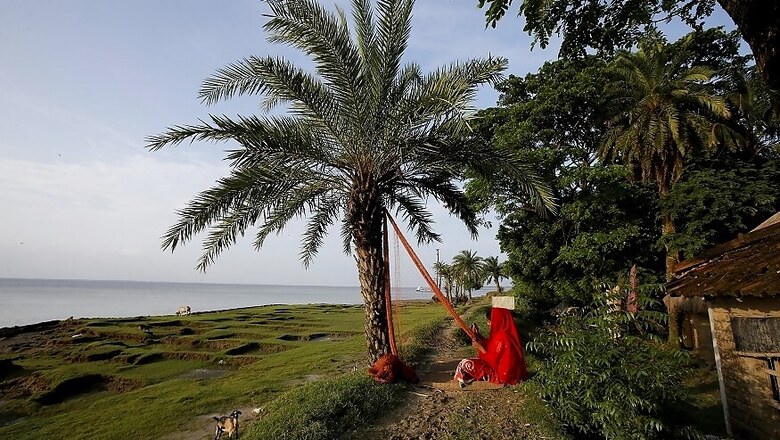
views
A tattered gamchha (indigenous bath towel) was left casually on the bank of Matla River to dry under the scorching sun.
A few metres behind, a makeshift mud house facing the Hamilton Island in the Sundarbans seems to be playing ‘hy-spy’ as Sukumar Duloi’s mended fishing net, hung on a bamboo pole, stands in between the scenic beauty.
Hamilton Island is named after Scottish businessman Sir Daniel Mackinnon Hamilton who made Bengal his second home.
Breaking the eerie silence of the sleepy hamlet of Deulbari Debipur (in Kultali in South 24 Parganas district), Sukumar, hammers a few wooden pieces into his boat to mend it for the next catch. His wife Bharati screams, "Khaabaar hoye gaechhey, kheye nao (The food is ready, come and eat it)."
While giving a numb expression to his wife’s call, Sukumar picks up his tattered gamchha from the riverbank, wipes the sweat dripping from his face and sits for a frugal lunch after washing his hands with pathor shaban (a locally made hard soap).
“It’s cheaper and multipurpose. You can bath and wash clothes too,” Sukumar explains.
Sukumar is among the many ‘crab-mara’ (expert in catching jumbo crabs from the river) who was forced to leave his Deulbari Debipur village a couple of years ago to work as a daily wage labourer in Tamil Nadu for better prospects.
Things were getting on track and then the coronavirus invaded their lives and it did irreparable damage to people like Sukumar for whom arranging decent meals a day is now a challenge.
Due to the lockdown woes, he was forced to come back to his village in Bengal and he engaged himself in odd jobs in the unorganised sector but that too failed to solve his problems or those of others like him.
The reason: exploitation by the employers who pay little.
A few days ago, while he was resting under the open sky in the evening on a cot, his wife Bharati told him that some local youths were engaged in social work along with the organisation Samaj Seva Bharati backed by the Rashtriya Swayamsevak Sangh (RSS) and they have taken up a two- year project under the banner of Atmanirbhar Bangla to make villagers self-reliant.
Bharati was told that the project is to empower the people in rural Bengal so that instead of migrating to other places for better job prospects, they can be a part of this sustainable development mission for better living by staying in their own villages.
News18.com found that not only Deulbari Debipur village but Samaj Seva Bharati, Sahakar Bharati and Bharatiya Mazdoor Sangh have chosen 120 remote and backward villages across the state for Atmanirbhar Bangla.
Starting from providing infrastructure, machinery and tools to the skilled workers to empowering women in learning the rural economy and ways to achieve their ambitions – these RSS-backed organisations are working round the clock on this sustainable-development programme to make villagers self-reliant.
Speaking to the News18.com, Dr Jisnu Basu, Karyavaha, RSS, South Bengal Pranta, said, “We have selected 120 remote and backward villages from all the districts in Bengal to make villagers and migrant workers self-reliant. We felt that in this time of a pandemic there is an urgent need to make them self-dependent by providing technical assistance to them. Most of them are skilled workers and they have good knowledge in their respective areas like farming, poultry, mechanical work, automobile repairing, civil activities, tailoring, etc. We will provide our support to them for 24 months to make them self-reliant so that they don’t have to move to other states for livelihood.”
Raising concerns over the extent of the damage that happened during Cyclone Amphan, he said, “Several acres of farmland was damaged as saltwater entered the low-lying areas. We are helping the farmers make their land cultivable again with chemical treatment. It will take some time for this and in the meantime we are supporting them by providing small boats so they can earn their living through the river economy. We did a small calculation and found that eight families can survive and earn their living for one month with the help of a single fishing boat. As an average, if we consider four members in a family, then a fishing boat can feed nearly 34-35 people in a month.”
Rajesh Laskar, Prachar Pramukh and also a teacher by profession, at Basirhat in North 24 Parganas, is also involved in various projects to uplift the lifestyle of migrant workers in that area.
“Atmanirbhar Bangla is a long project and till they become self-reliant, we are assisting these poor villagers with food, clothes, medicines and other daily requirements. Alongside, we have plans to train them in various sectors like cow-based economy, how to open an automobile garage, what skills it requires to open a garage, tailoring skills, cow-dung products, salesman skills for small items like lozenges, bindi, bangles, leaf plates, eco-friendly bags, pickles, homemade sweets, papad, etc. So far, the response is very good and I hope people in backward villages will benefit from our initiatives,” Laskar said.
Extensive social work by the Sangha karyakartas and affiliates is nothing new in Bengal but despite being the home state of Jana Sangh ideologue Syama Prasad Mukherjee, the RSS was hardly worthy of notice here for decades.
Since the near-absolute rout of the CPI(M)-led Left Front and Narendra Modi’s ascent to power in 2014, the Sangh has suddenly emerged as a force to reckon with in the state.
So much so that veteran journalists who have covered politics for years are getting into the habit of making the rounds of Keshav Bhavan in north Kolkata, a nondescript building that houses the Sangh’s regional headquarters. Even till a couple of years ago, most reporters would have walked past the building without a second glance.
This sudden attention from the media has not changed things much for the RSS and it continues to run its show the way it always has, away from the public eye.
The Sangh has carefully draped its saffron veil over all its activities, be it organising workshops or top RSS functionaries addressing regular seminars at Salt Lake Sector V, Bengal’s IT hub. Even though the practice is to organise workshops spanning over 15 to 20 days as part of 'karyakarta nirmaan', an initiation process to train new cadres, such sessions have hardly ever drawn any attention.
The Sangh, which has been silently active in West Bengal ever since the Partition, has been moving like an invisible force through the swathe of refugees, who made their way across the border in 1947, and then in 1971. And till today, it is working actively in rural as well as in urban Bengal on various projects for the betterment of society.
The winds of change have started to blow, particularly since Narendra Modi came to power in 2014. Even the state BJP, which was not even a marginal force in the state’s political scenario, has started claiming bigger stakes.
Things changed even more with the arrival of Dilip Ghosh on the scene, as he took over as president of the state BJP unit in late 2014. An old RSS hand, with around 25 years of field experience in the East and the Northeast, he was brought in to infuse fresh blood into the party’s state unit.
The proximity of the BJP leadership with the Sangh has often been questioned in the face of criticism that the party is just the political manifestation of the RSS, a conclusion that has been objectively refuted by both BJP and RSS leaders.
Although the number of shakha or individual units, along with the members’ roster, has been a closely guarded secret for decades, a senior RSS functionary let out that the number of shakhas has gone up from 800 in 2011 to nearly 2,000 (daily shakhas) in 2020.
RSS has set a target of opening one shakha at each gram panchayat of West Bengal by 2021, a target which many connect with the upcoming assembly polls in the state next year.
The working president of Bharatiya Mazdoor Sangh in Bengal, Ravi Singh, said, “We are a non-political organisation and our motto in life is ‘seva’ and only ‘seva’. We are here to serve the people mainly in rural Bengal. Yes, we collectively have taken the responsibility to make people 'atmanirbhar’. If people become ‘atmanirbhar’ then they will be able to make decisions freely without any pressure and compulsion. We have set up 38 help desks in 19 districts to help poor villagers and migrant workers. Our survey revealed that out of 100 per cent, nearly 80 per cent want to go back to other states for jobs and the rest 20 per cent want to stay back in their home village. So, we have decided to make these 20 per cent villagers self-reliant. Through these help desks, we are trying to know their interest areas and subsequently we are helping them in training.”
While elaborating more on the training, he said, “We will provide them training in making hand sanitisers, face masks, farming, bleaching powder, phenyl, incense sticks as well as civil work, etc. We have also started working on preparing a database of migrant workers. I feel that this is certainly going to be a boon for the villagers living in remote villages.”
Sanghathan Sampadak of Sahakar Bharati, Vivekananda Patra, too has an elaborate plan to empower the villagers through self-help groups.
“There is no dearth of talent in villages and we are just shaping their dreams through technical support. For example, wheat flour...we have started packaging of wheat flour in some of the villages and marketing it in the rural kirana shops. The cost of wheat in rural Bengal is not much but private companies are selling packed wheat flour at exorbitant prices and people are buying it. You ask anyone in urban areas about the price of 1 kg of wheat, most of them will not be able to tell the price. We thought to educate people about the economy based on wheat flour through attractive packaging. It works,” he said.
“Similarly, we are helping these villagers in marketing honey, mustard oil, tea through processing units, and packed pulses. Not the least, to those who have passed engineering, we are providing support, so that they can start their own construction company on a small scale. Our target is to save these people from touts and we believe that the rural economy should be utilised to uplift rural people,” Patra said.

















Comments
0 comment